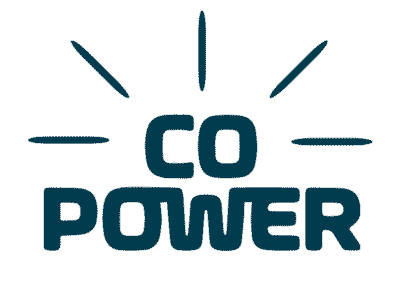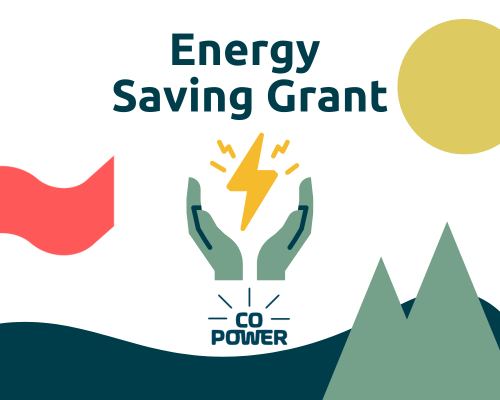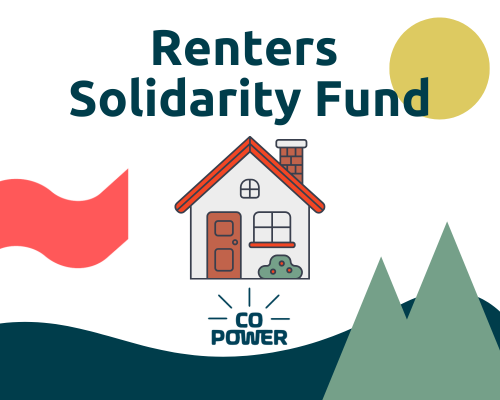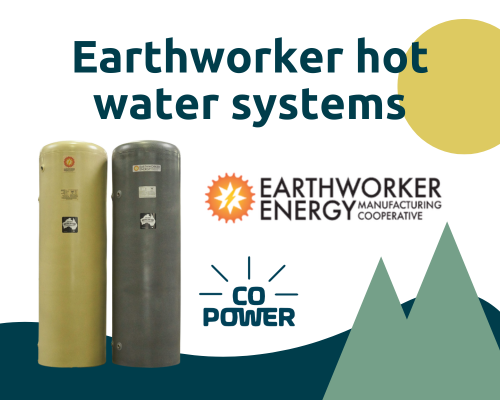Understanding your electricity bill
May 28, 2021
Having trouble paying your bill?
May 28, 2021For most customers the main cost in your bill is for the electricity you use (see our guide to Understanding your bill). At Cooperative Power we want to help you reduce the energy you use so you can save money. Energy efficiency reduces the amount of electricity you use. For example, an old heatpump in your house might use 1000 kWh each year to heat the water you use for washing and showers. One way to reduce this cost is to use less hot water by, for example, shorter showers. Another way is to replace your old heatpump with a new more efficient model. To make the same amount of hot water this more efficient heatpump might only use 600kWh each year. Reducing energy use by either of these methods – using less electricity with your current appliances or replacing older appliances when they stop working with more efficient appliances – reduces your electricity bill.
Keeping this in mind helps guide where energy efficiency can have an impact. Mobile phones are charged often but each charge is a tiny amount of energy. The annual total for a phone charger might be only a few kWh. Some electric appliances – room or central heating systems, hot water systems, TVs, refrigerators and others – used every day consume a lot of electricity each hour they operate so over a year their total electricity use is large.
Energy efficiency is a huge area. This short guide aims to help you with some general and specific suggestions on reducing your energy costs using low-cost or free methods. We’ve also listed some links to other detailed government sources and third-parties that many people find helpful. Note that some of the suggestions and links will help houses that use gas as well as electricity. We’re pleased if we can help you reduce your energy use whether its electricity or gas.
Let’s start with some government guides.
- Sustainability Victoria has a wealth of information on household energy efficiency including a split of annual energy use in Victorian homes: https://www.sustainability.vic.gov.au/You-and-your-home/Save-energy.
- The Victorian State Government lists a range of ways to save energy: in winter and in summer.
- And the Commonwealth Government provides detailed information on many home energy topics: https://www.yourhome.gov.au/.
- For anyone who would like detailed interactive information on how energy is used in a house, see this detailed information from CSIRO: https://ahd.csiro.au/other-data/typical-house-energy-use/.
Renew (formerly the Alternative Technology Association) publish a magazine (also called Renew) with articles covering a range of energy efficiency topics. For example: https://renew.org.au/renew-magazine/efficient-homes/unravelling-home-energy-use-across-australia/. The consumer advice organisation Choice (https://www.choice.com.au/) covers household energy efficiency topics.
Common large energy uses in a home are heating, water heating and refrigeration. Televisions and home theatres, lighting and cooking are smaller energy users. People using a desktop PC or laptop with a printer while working from home will use more electricity. Air-conditioning is increasingly common in Victoria and with climate change increasing summer temperatures air-conditioning energy use may increase. And swimming pool pumps can use a considerable amount of electricity even in Victoria’s shorter swimming season.
From this wealth of information we’ve selected some energy efficiency suggestions to help Cooperative Power customers start saving money on their bill.
Some general recommendations.
- Turn off electric appliances at the wall socket when you’re not using them. This is quick, easy and immediately starts saving you money. Many appliances still use what’s called standby power even when not in use. An empty beer fridge in the shed or garage is costing you all the time it’s on.
- When an old appliance fails and can’t be repaired, if funds allow, replace with good quality, energy efficient appliances. Although initially more expensive, good quality appliances will often last longer and be more energy efficient. Buying good quality appliances that last longer can save you money on future replacement costs as well as using less electricity. At the time of writing, the Victorian State Government is subsidising purchase of energy efficient appliances: https://www.victorianenergysaver.vic.gov.au/save-energy-and-money/discount-energy-saving-products/save-with-these-energy-efficient-products. This subsidy may reduce any extra out-of-pocket cost of an energy efficient appliance compared to an appliance that’s less energy efficient. The Commonwealth Government has an extensive guide to energy efficient appliances available in Australia: https://www.energy.gov.au/households/appliances.
- A home energy monitor will help you work out when you’re using electricity and what’s using the electricity. Some monitors show the amount of energy in use and what it’s costing. This can be a surprisingly effective way to encourage household members to use less electricity. Some studies report household annual electricity savings of up to 15% with a monitor.
Heating and cooling.
Heating is often the largest single energy use in a home. There’s a heap of things that can help to make a home need less heat to maintain a comfortable temperature when it’s hot or cold outside. Retrofitting and weather-sealing to reduce draughts and leaks and insulation can make a big difference. But they are topics for another guide.
Here’s some cheap and easy-to-do suggestions:
- Turn down the heater and air-conditioner. Keeping the house at 20C uses less energy than keeping it at 22C in winter or 18C in summer. If you are comfortable with higher temperatures in summer and lower temperatures in winter this will reduce energy use. Wearing jumpers in winter and cool clothes in summer can reduce how much heating and cooling you need.
- Keep external windows and doors closed to stop heat getting out in winter or heat getting in during summer.
- Curtains and blinds:
- on west facing windows help keep rooms cooler in summer.
- with a pelmet help keep rooms warm in winter
- When the cool change comes through in the afternoon, if you have windows that can be opened safely this is a great way to cool a house down.
- Does the whole house need to be kept at the same temperature? Closing doors into the bedrooms and other areas helps keep living areas at a comfortable temperature with less energy used.
LED lights.
These bulbs are very energy efficient. Many houses built over the last 20 or so years used halogen lights. Sometimes up to 20 in a kitchen. Replacing halogens by LEDs can save up to 80% of the electricity used! LEDs are also more efficient than compact fluorescents and last a lot longer than halogens and fluorescents.
Drying clothes.
An appropriate technology, solar-powered, flexibly-sized, low-maintenance clothes drying system – AKA a clothes-line – uses solar power cheaply and directly to dry clothes. And the UV in sunlight is an excellent disinfectant. Some clothes aren’t suited to drying in sunlight so check the label.
Monitor your energy usage.
If you have the time and the bandwidth you can also monitor your energy usage. While we don’t have an app at CoPower. You can monitor your usage online through our retail partner Energy Locals.




